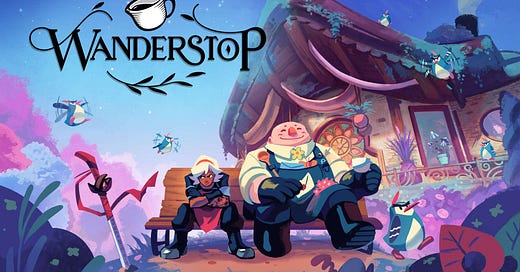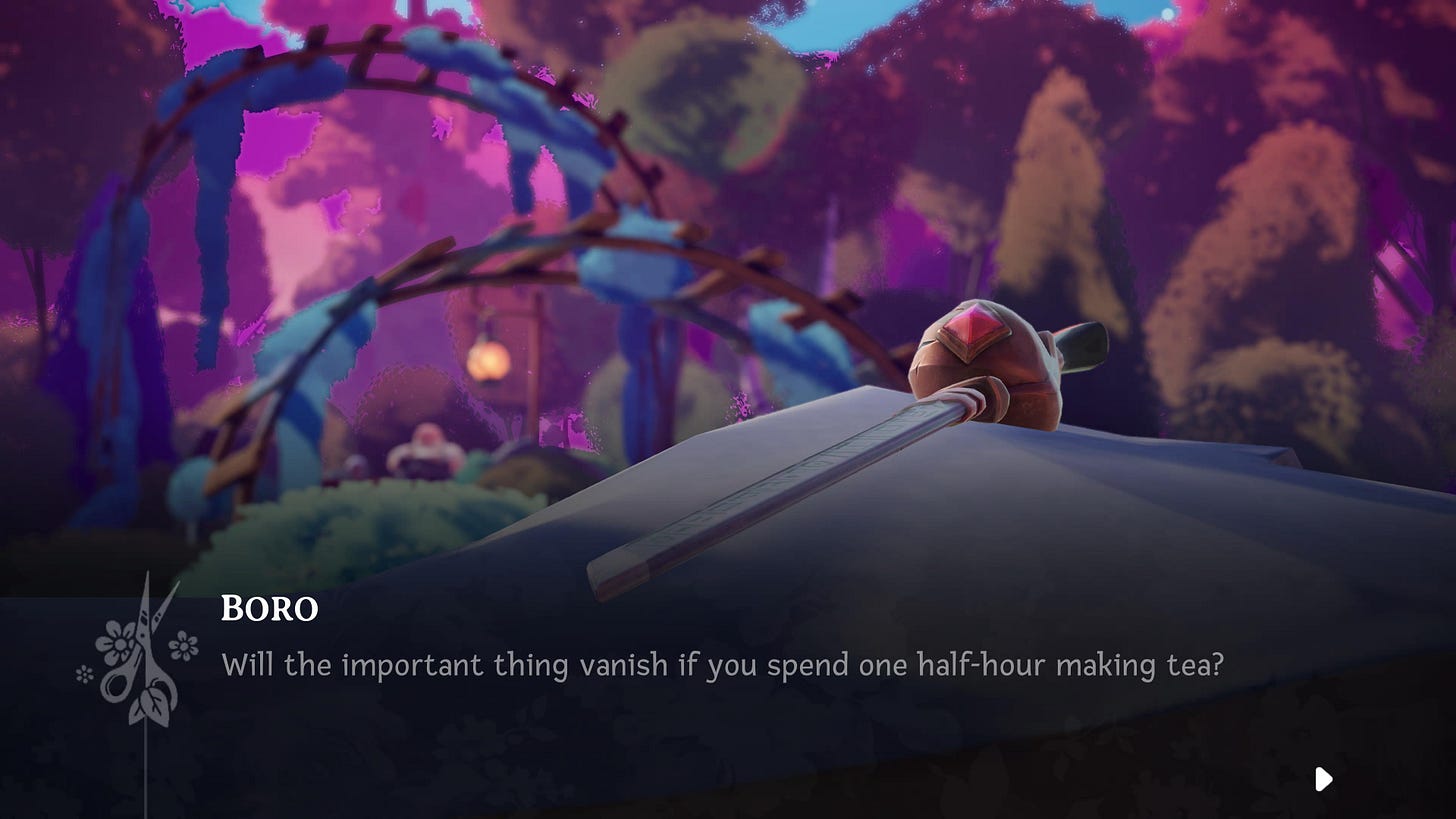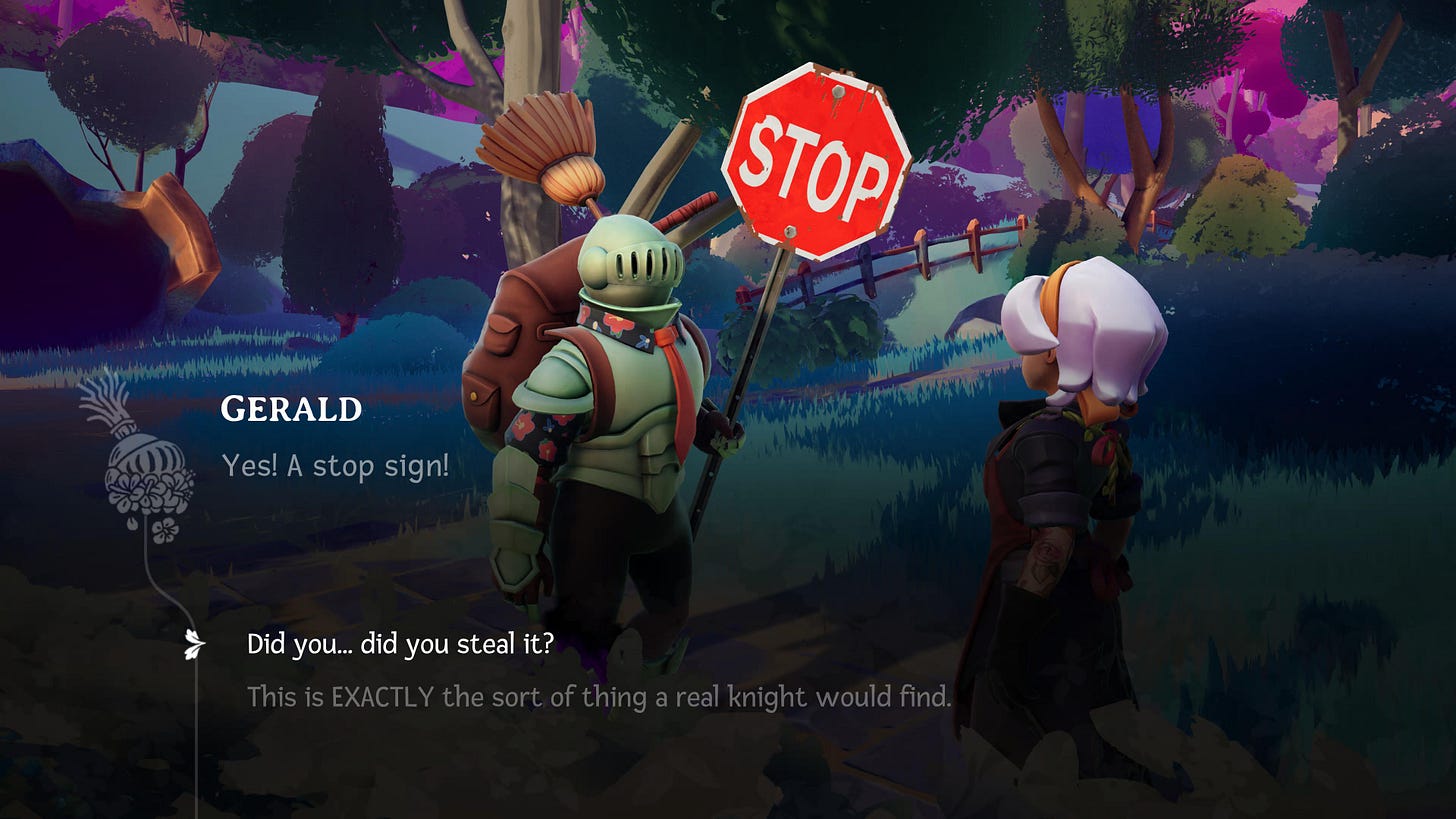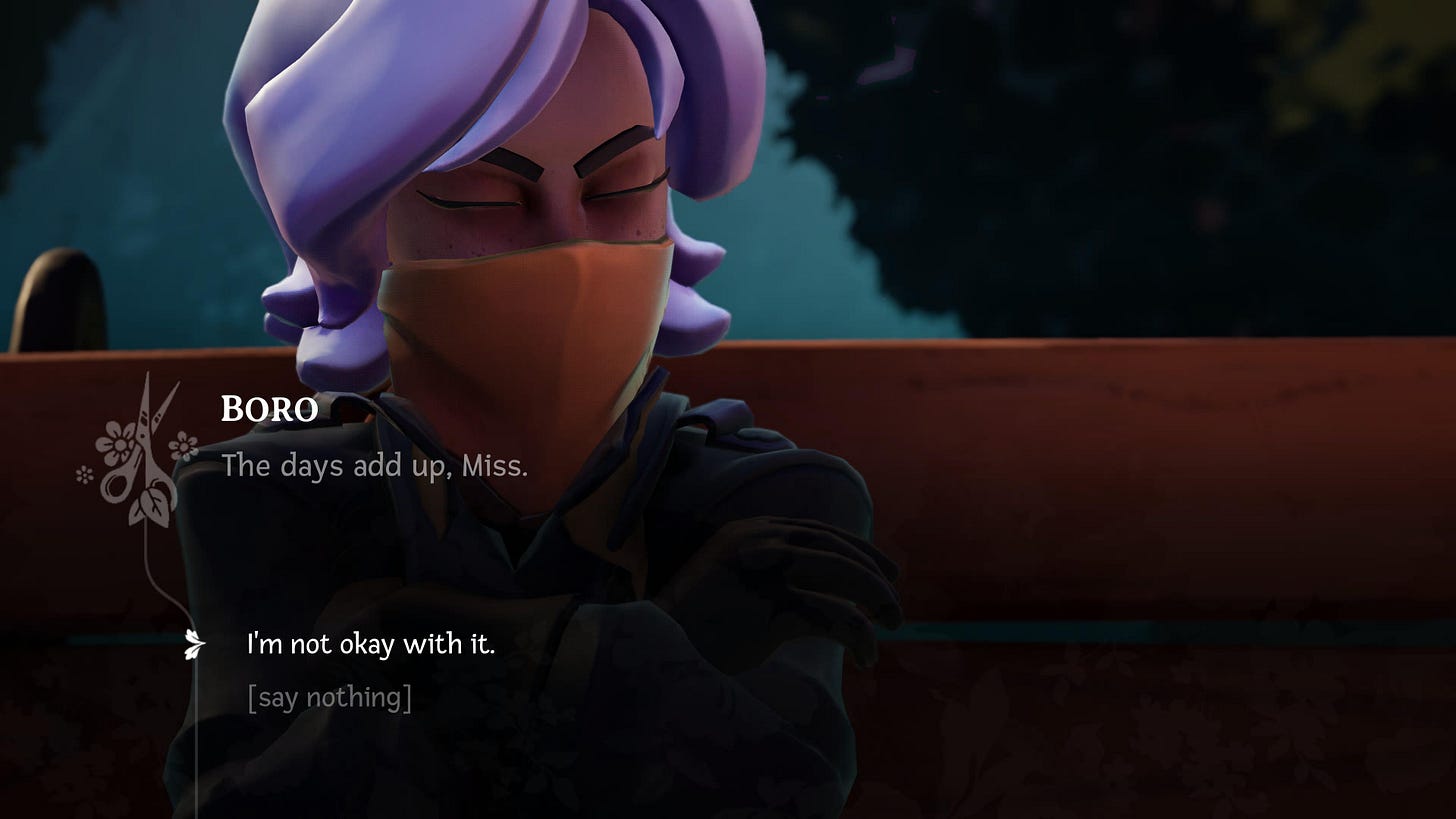Wanderstop tells you what it’s about plainly.
Alta, a fighter who can no longer lift her sword, finds herself running the titular tea shop, Wanderstop, a waystation for weary travelers. She will remain here, planting seeds and brewing tea, until she is strong enough to lift her sword again—if she ever does.
The mechanics of Wanderstop are simple, almost aggressively so. You pluck leaves. You steep tea. You serve it to visitors who drift through the shop like characters in an unusually literary bedtime story, each with their own troubles, their own subtle arcs. If you are the kind of player who enjoys “doing things” in a game—if your pleasure in a narrative experience comes from the resistance of a challenge, the careful flex of problem-solving muscle—Wanderstop might not be for you. But if you are someone who loves to read, to linger over a passage not because it is necessary but because the prose is a delight, then you might find yourself enchanted. I certainly did.
Wanderstop is draped in the aesthetic of mystery, inviting curiosity at every turn. The tea shop itself, its ever-present keeper Boro, the reason Alta—literally—cannot pick up her sword. It is easy, even natural, to play in pursuit of unlocking these secrets. And yet, the game also wants you to resist this impulse. It lures you in with intrigue but insists that you let go of that desire for answers. As Boro reminds you early on, “Will the important thing vanish if you spend one half-hour making tea?”
If you sprint through the menial tasks, driven by a hunger for revelation, you will miss the game entirely.
The first time I met Gerald, the would-be knight, who puts on a suit of armor to impress his forever-exasperated son, he treated me to a collection of family photos. There are photos, accompanied by stories from Gerald, about making his son a sweatshirt with his face on it, about waking him up at all hours of the night to take photos, about voting in local elections and visiting museums featuring giant cheese wheels. After every photo, I was given the option to ask for another one, or to end the conversation and move on with the game.
The game.
Even here, I kinda have to catch myself. The trick at play, clearly, is that this is the game. Gerald’s stories, free from achievements and progression bars, are the game.
And these stories are best savored, its humor best appreciated when allowed to steep, much like the tea you serve. Gerald is worth talking to not because he holds the key to some grand revelation, but because he is, simply, fun to talk to. The game is filled with characters like this—people whose lives are unfolding in small, compelling ways, who are neither mysteries to be solved nor obstacles to be overcome, but simply interesting. It is almost a visual novel, yes, but with enough ritual in its tea-making and tending that you never feel like you are just clicking through dialogue options. It does enough to keep you busy—to keep you cozy—if you allow it.
But, dear reader, I am not a Cozy Gamer.
I found the tea-making of Wanderstop to be tedious and its occasional puzzles underwhelming. The literal actions you take are, in fact, ritualistic, and puzzles barely ever go beyond planting some of your few seed options into a few different shapes on the ground. It’s just kinda dull and, unlike the characters that occupy the title, doesn’t really develop into something particularly meaningful.
I fear that, by admitting this, I open myself up to a common pseudo-artistic refrain: “that’s the point!” But the intention doesn’t make the act more meaningful. The characters aren’t interesting to talk to because they are unrelated to Alta’s main struggle—they’re interesting because they’re interesting. The game mechanics don’t suddenly become compelling because they’re “supposed” to be monotonous.
And yet, for all its confidence in stillness, Wanderstop betrays a certain nervousness, a quiet, insistent fear that the player might not be paying close enough attention. It signals its themes too often, too openly, as though worried that subtlety might leave them undiscovered, as if it does not trust the player to pick up on its key ideas without an occasional elbow in the ribs.
Early on, Alta says something like, “I can’t just listen to people talk. I’m looking for something to keep me engaged.”
And I wanted to say back, I know! I see what you’re doing! There’s a touch too much of this, the game pausing to underline itself, to highlight its own insights before you’ve had the chance to stumble into them on your own. Too often the subtext is hoisted up into text, as if the game is worried we might not notice its depth if it isn’t spelled out.
And yet, for all this hand-holding, Wanderstop is not without real, resonant feeling. There is something undeniably poignant in its meditation on burnout, on exhaustion so deep that even healing feels like labor. But the game does not seem to trust that this idea carries weight on its own—it circles back to it again and again, stating outright what is already so achingly present in Alta’s every quiet motion. It is as if the game believes that the mere invocation of burnout, the acknowledgment of the need to slow down, is profound in and of itself. And perhaps, for some, it is. Perhaps, for some players, gesturing so broadly at burnout—something we all surely feel—is enough.
Fine.
But here’s the thing: I lingered. Happily. Because for all its over-explanation, Wanderstop understands something essential—that meaning is not always in the lesson, the moral, the carefully articulated theme. It’s in the space between things. It’s in the idle drift of conversation and the way a sentence lands. It is not a game about revelation, but about presence. And, even when it stumbles, I find myself forgiving it. I just like the flavor.
Thanks for reading all that.









But Jake, you have to take a step back and consider really dumb readers like me, who can’t understand the themes of the text even when I read the cliffsnotes explaining them to me. I know the handholding is ultimately detrimental, but as a baby when it comes to understanding literature, I appreciate them.